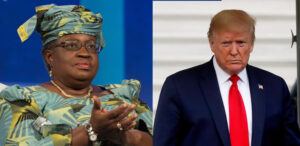
The European Union has welcomed U.S. President Donald Trump’s recent decision to suspend certain tariffs for 90 days, viewing it as a significant step toward stabilizing global trade tensions. European Commission President Ursula von der Leyen lauded the move, describing it as “an important step towards stabilising the global economy,” and called for further dialogue aimed at achieving a zero-for-zero tariff agreement between the U.S. and the EU.
Despite the EU’s praise, von der Leyen did not confirm whether the bloc would proceed with previously approved retaliatory tariffs on $23 billion worth of U.S. goods. These measures were initially authorized in response to earlier U.S. tariffs imposed on European steel and aluminum exports.
Meanwhile, the Director-General of the World Trade Organization, Dr. Ngozi Okonjo-Iweala, has raised concerns about broader implications for the global economic order. In a recent statement, Okonjo-Iweala warned of the growing risk that the world economy could fracture into two rival blocs led by the United States and China. She cautioned that such a split could lead to a 5% decline in global GDP in the long term, citing the importance of a unified and rules-based multilateral trading system.
“Economic interdependence has historically fostered peace and prosperity,” Okonjo-Iweala stated, emphasizing that deglobalization and economic decoupling would be detrimental for all nations.
As the international community responds to shifting trade dynamics, leaders are now faced with the challenge of navigating rising geopolitical tensions while safeguarding global economic stability.




